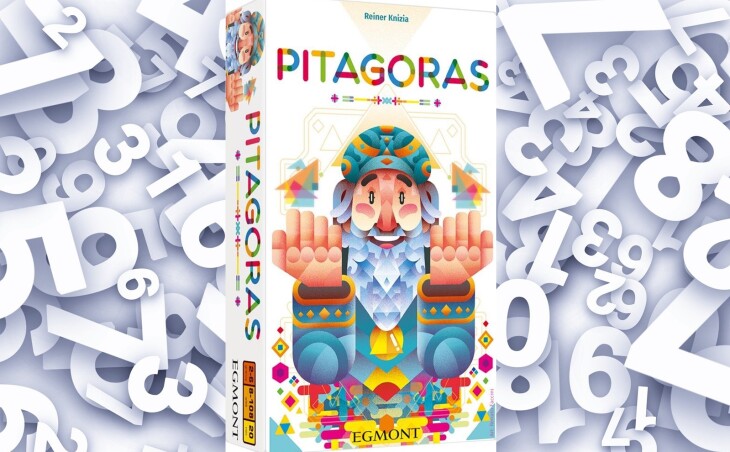Less than a year ago, I reviewed Archimedes , a logical thinking game. Recently, the Egmont publishing house decided to publish more proposals of Reiner Knizi. Here’s Pythagoras !
In a small box…
…we find 55 cards (4x 1 to 10, 2x 11 to 14, 1x 15 to 19, 2x 20), 2 blue dice (0-2-3-4-5-8) and (20-30-40 -50-60-70), 1 black die (30-50-70-80-90-110), 1 red die (0-10-20-0-10-20). Using the cards, players make up actions with numbers. With their help, they get the result rolled on the dice. The object of the game is to collect the indicated cards as a bonus. The one with the most cards wins.
A few words about the course of the game
Pythagoras , as well as Archimedesare characterized by very simple rules. Once we have shuffled the cards and placed them face down in a deck in the center of the table, then drawn five cards and placed them face up next to the deck, we must roll the blue dice. The sum that comes up is the score – the goal for the players to achieve. All participants of the game simultaneously try to arrange such actions in their minds that will allow them to reach the sum indicated on the dice. They can use any combination of mathematical symbols, i.e. +, -, x, ÷. The person who comes up with the correct action should exclaim MAM! and then – without undue delay – arrange the cards in such a way as to indicate the correct result. The player does not get extra time, but his shout means that he knows the exact solution. Importantly, if the player is unable to arrange the correct action,
At the end of the round, each player places the cards he has won in a pile in front of him. A new round begins by turning over more cards from the deck to complete the pile in the center of the table to five cards. We continue the game according to the described rules. The game ends when there are not enough cards left in the face-down deck to make the face-up pile to five. All players count their cards. The player with the most wins. In the event of a tie, the person who was the last to indicate the correct answer wins.
In times of uncertainty
If players are unable to find a correct solution, an additional card must be placed and the dice rolled again. If there is still no solution, we play another card and roll the dice again. In the game we only use whole numbers (no fractions). The speed at which the action is served determines the winner, not the number of cards the action is made of. Knizia offers different levels of difficulty. If we want to reduce it, we remove all cards with values greater than 15 from the deck; we can also exchange the blue die with two-digit numbers for a red die with smaller numbers. However, if we want to increase the difficulty level, let’s replace the blue die with two-digit numbers for a black die with larger numbers. You can also allow exponentiation to play (one of the numbers on the card becomes the exponent).
In closing words
Pythagoras is an excellent puzzle for everyone who likes mathematical puzzles. This compact game is designed for 2-6 players aged 8 to 108. The average game time is 20 minutes. I recommend it especially to parents who want to practice mathematical equations with their pupils. The card game was made with the greatest care, moreover, it contains all its elements in one box (so you can easily take Pythagoras on every journey). So if you are looking for something special for your kids 8+, take a look at the reviewed proposal!
Nasza ocena: 8/10
Another great mathematical proposal from Egmont!ORIGINALITY: 6/10
REPLAYABILITY: 7/10
PRODUCTION QUALITY: 10/10
PLAYABILITY: 9/10

